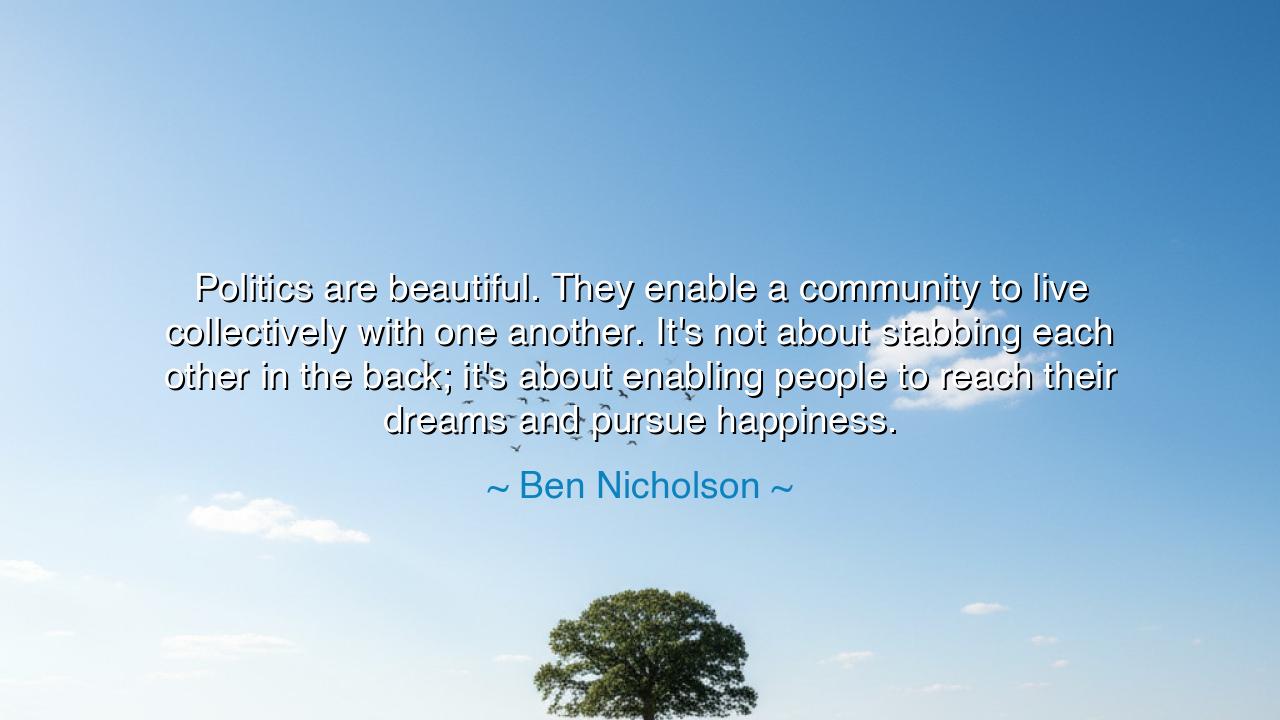
Politics are beautiful. They enable a community to live
Politics are beautiful. They enable a community to live collectively with one another. It's not about stabbing each other in the back; it's about enabling people to reach their dreams and pursue happiness.






The words of Ben Nicholson shine like a torch lifted in a darkened age, calling us to remember the noble origins of human governance: “Politics are beautiful. They enable a community to live collectively with one another. It’s not about stabbing each other in the back; it’s about enabling people to reach their dreams and pursue happiness.” In this, Nicholson reminds us that politics, though often maligned and corrupted, were never meant to be a theater of deceit or ambition, but rather a sacred art — the art of living together. His words are not naïve idealism, but a return to the ancient heart of political life, where leadership was an act of stewardship, and power a burden carried for the good of all.
From the beginning of civilization, the dream of humanity has been to find a way to live collectively, to transform the chaos of self-interest into harmony. The ancients called this the polis — the city-state — not merely a place of walls and markets, but a living body of souls united in purpose. It was here, in the agora of Athens, that the idea of politics as beauty first took root: the notion that when free people deliberate, when they reason together, when they share both burdens and hopes, they build something greater than themselves. Nicholson’s vision, though modern in voice, is ancient in spirit — for it recalls that politics, at its best, is not warfare, but communion.
Yet how far we have drifted from this truth. In our time, politics is often spoken of as corruption, deceit, or endless struggle. But such cynicism is not born from the nature of politics itself — it comes from the corruption of its purpose. Nicholson’s plea is a call to remember: that the goal of governance is not dominance, but enabling; not to divide, but to unite; not to control dreams, but to make them possible. For when power serves only itself, it decays; but when it serves the people, it becomes radiant — a true reflection of the divine intelligence within humanity.
History offers us both the tragedy and triumph of this truth. Consider Pericles, the Athenian statesman, who stood before his citizens during the golden age of Greece and said, “We do not copy the laws of our neighbors; we are an example to them.” Under his guidance, Athens became a beacon of art, learning, and freedom. His politics were not born of cruelty, but of faith — faith that people, if trusted, could rise to greatness. Yet even that shining city fell when politics turned inward, when envy and greed eclipsed the common good. So too in every age: when politics forgets its beauty, it becomes monstrous.
Nicholson’s words are not a denial of struggle, but a redirection of it. For there will always be disagreement — and rightly so — but debate need not become hatred, and difference need not lead to division. True politics, he reminds us, is not the stabbing of daggers, but the meeting of minds. It is the recognition that though we walk different paths, we share one destiny: the pursuit of happiness, the fulfillment of dreams, the peace of living together without fear. To practice politics in this spirit is to practice compassion, courage, and wisdom in their highest form.
Let us remember, too, the example of Nelson Mandela, who emerged from long imprisonment not with vengeance, but with vision. When he took up the work of building a new South Africa, he did not wield politics as a weapon, but as an instrument of healing. He spoke of unity, of forgiveness, of creating a nation “where all people, regardless of race or creed, could walk tall.” Mandela’s politics were beautiful because they sought to restore the humanity of both oppressor and oppressed. In his hands, politics became what Nicholson describes — not a contest for power, but a vehicle for human flourishing.
And so, my children, the lesson is clear: politics is not something apart from you; it is the mirror of your collective soul. If it has grown cruel or shallow, it is because too many have turned away from it in despair. To restore its beauty, you must restore your faith in community, your belief that shared life is still possible. Speak not only to win, but to understand. Lead not only to rule, but to serve. Dream not only for yourself, but for the common good. For the measure of a people is not in their wealth or power, but in how they govern their own hearts.
Thus, live as citizens of the greater polis — the world itself. Let your words build, not wound. Let your actions unite, not divide. And when you think of politics, think not of corruption, but of the noble work of humanity striving to live as one. For in truth, politics are beautiful — when they rise from love, guided by justice, shaped by wisdom, and devoted to the eternal purpose of every civilization: that all may reach their dreams and pursue happiness together.






AAdministratorAdministrator
Welcome, honored guests. Please leave a comment, we will respond soon